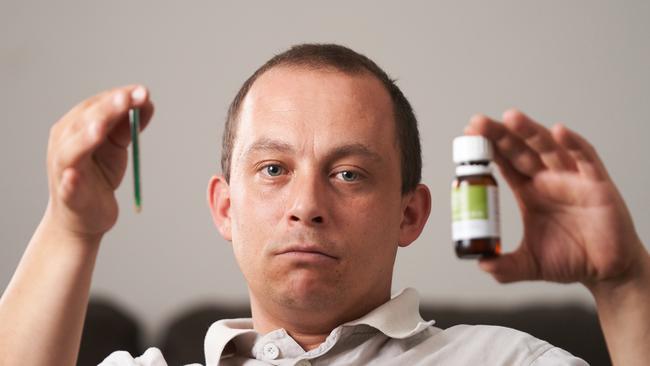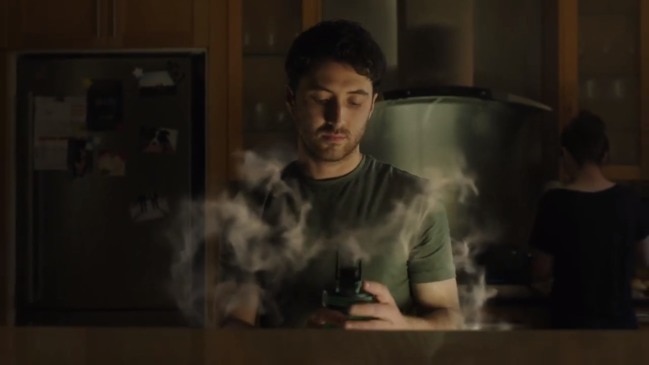Cannabis oil user Brenton Peters calls for drug driving reform after getting charges thrown out of court in landmark decision
A medicinal cannabis oil user has had charges of drug driving dismissed in a court decision that found the MS sufferer was not affected by the drug despite a positive test.

Police & Courts
Don't miss out on the headlines from Police & Courts. Followed categories will be added to My News.
- Charges apply even after the high, police threaten in new ads
- Latest subscriber exclusive giveaways, specials and prizes
A driver with a prescription for medicinal cannabis oil has had a charge of drug driving dismissed by an Adelaide magistrate in a landmark finding.
Now Brenton Peters, who says the cannabis oil provides him with relief from the muscle cramps and stiffness associated with his diagnosis of multiple sclerosis, and his legal team are calling for changes to driving laws.
Mr Peters is one of 3500 Australians to be legally prescribed the oil which contains equal parts THC, the compound which causes the “high” and cannabidiol, which is used to treat medical conditions.
The cannabidiol works as an uptake inhibitor which eliminates the psychoactive side effects of the THC, but gives Mr Peters a window of time when he can move around without a wheelchair.
In the space of a few years the now 34-year-old went from being a mobile, water sports loving young man to near wheelchair bound, racked with pain.
“My legs become very stiff, I don’t have any flexibility, I’ve got to rely on having walls close to me and if I want to venture outside the house I’m in a wheelchair,” he said.
“I just don’t have the balance without it. Your brain is more than willing to do things but your body stiffens right up.
“It is all a bit of a juggling act to do the simple things that everyone else takes for granted.”

After two years of applying for a prescription to take the cannabis oil, the young father of two was given the life changing medicine in October 2018.
“The oil just gives back the flexibility of all my joints, it relieves whatever is causing the joints to be stiff because of the MS,” Mr Peters said.
“It changes the quality of life for me, makes me fit enough to be a father to my two kids.
“I take 3ml a day, two in the morning which gives me six hours of usable leg time, and then take the rest to try and keep it going.
“By eight hours I am really in trouble, I need someone under my arm if there isn’t something for me to lean on.
“That is my daily life, without the cannabis oil I am confined to a bloody wheelchair.”
Already taking thousands of tablets a year, the oil has greatly reduced Mr Peters reliance on opiod based pain killers.
Only weeks after receiving his prescription he was pulled over by police and tested positive to THC, one of the compounds within the cannabis oil.
He lost his licence but, armed with the prescription from his doctor, took the order to court.
Magistrate Susan O’Connor dismissed the case on the grounds the Mr Peters was not impaired by THC when he drove the car.
Despite the ruling, Mr Peters will run into the same problem if he is pulled over and tested by police again.
He is calling for change to legislation which would allow people with a prescription for cannabis oil to be able to drive and live their lives normally.
“This isn’t just about me, it is a wider community and a bigger problem,” he said.
“You’ve got people out there like myself who are trying to do the right thing and have some sort of quality of life.
“If a doctor has proved that I’m not impaired by a drug that they have prescribed then eventually legislation needs catch up.”
Mr Peters’ lawyer Danial Esmaili from Stanley & Co Lawyers said the cannabis oil was a treatment of last resort and only prescribed to people who had tried all other medical avenues.
“The legislation is designed to punish people who take drugs and drive, but there is no provision in the current legislation if you have a prescription for CBD oil,” he said.
“We are at a crossroads where the law hasn’t really caught up with these people who have certain medicinal needs and in very rare cases like Mr Peters, have a prescription from their doctors.”
President of Law Society of South Australia Tim White said the increasing use of cannabis oil would require a re-evaluation of the state’s current drug driving laws.
“Any proposal to allow medicinal cannabis users to drive should be restricted to products where the psychoactive component is deactivated or negligible,” Mr White said.
“A particular complication with the notion of exempting drivers who legally use medicinal cannabis is the fact that our drug-driving laws are modelled on the basis of detection, not impairment.
“So the fact that THC is detected in your system, if you are driving, constitutes an offence.”
